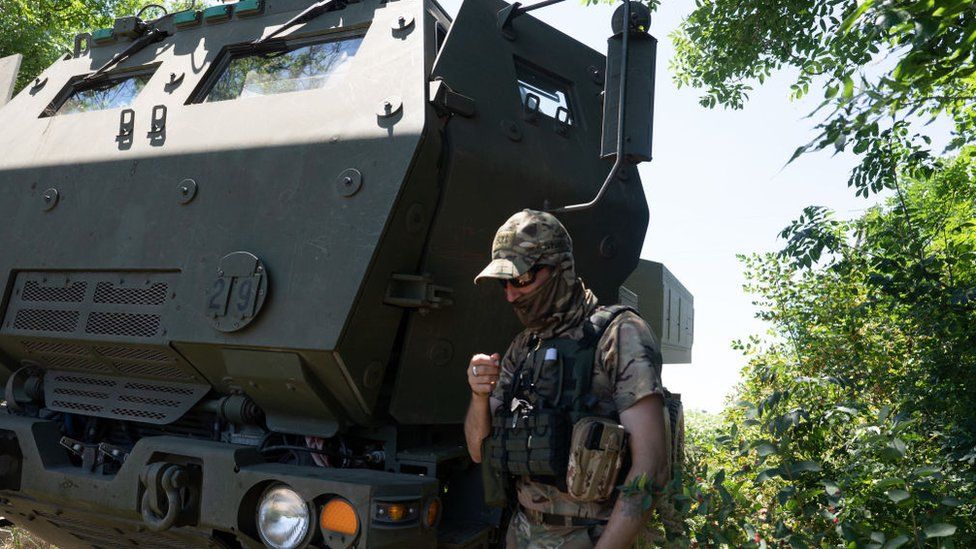ARTICLE AD BOX
 Image source, Getty Images
Image source, Getty Images
A Ukrainian soldier next to a US-supplied Himars vehicle
By Bernd Debusmann Jr & Hugo Bachega
BBC News, Washington and Kyiv
A warning by top Republicans that they may reduce aid to Ukraine if they win control of Congress adds a combustible ingredient to the looming vote. But would anything really change?
A video posted online by Ukraine's Ministry of Defence - set to the tune of US heavy metal band Metallica - depicts what has emerged as one of the signature images of the country's war with Russia.
It shows the fiery streak of a US-made rocket being fired upward, followed by a fireball lighting up the night sky as it hits its target.
The weapon, known as a High Mobility Artillery Rocket System, or Himars, is one of 18 so far given to Ukraine by the US. It's part of a huge assistance package of $52bn (£45bn) which is twice as much as all other countries combined.
Military experts and the Ukrainian government say this support has been vital to their mission.
"The Ukrainians would have been overrun without it," said Mark Cancian, a former US Marine colonel and defence expert at the Center for Strategic & International Studies.
But this pipeline of support could be thrown into doubt. Some Republican lawmakers have questioned its merits as Americans struggle with rising bills.
What have Republicans said about aid for Ukraine?
Earlier in October, House Minority Leader Kevin McCarthy - the top Republican in the House of Representatives - suggested that a Republican-controlled Congress would be disinclined to write a "blank check" for Ukraine.
Currently, his party are favourites to take control of the House, the lower chamber of Congress which initiates all spending resolutions, according to the US Constitution.
"I think people are going to be sitting in a recession, and they're not going to write a blank check to Ukraine," he told Punchbowl News.
Other Republicans have expressed similar doubts. In May, for example, Missouri Senator Josh Hawley said that Ukraine aid is "not in America's interests" and "allows Europe to freeload".
The comments appear to have highlighted divisions in the party, with former Vice-President Mike Pence harshly condemning Putin "apologists" and members of his own party that would "have us disengaged with the wider world".
Similarly, Senate Republican Leader Mitch McConnell has called on the White House to step up assistance to Ukraine, saying the US needs "to do more to supply the tools Ukraine needs to thwart Russian aggression".
Notably, only Republicans - 57 in the House of Representatives and 11 in the Senate - voted against a $40m aid package to Ukraine in the spring.
Will the US actually withdraw aid?
Despite growing concern about the future of US assistance to Ukraine, Ukrainian officials and US-based observers say it is unlikely that aid will be significantly slashed in the short-term, regardless of the outcome of the November election.
Speaking to the BBC in Kyiv, Ukrainian defence minister Oleksii Reznikov said that his previous meetings with US lawmakers - which have included both Democrats and Republicans - have left him confident that US aid will continue to reach the country.
"I got a lot of signals that it doesn't matter who will steer… bipartisan support for Ukraine will be continued," he said. "I believe in that."
John Herbst, who served as US ambassador to Kyiv between 2003 and 2006, said Mr McCarthy could be guilty of political posturing for the benefit of the right of his party.
"There's no doubt that on the populist, Trump side of the party, there's scepticism about assistance to Ukraine, and even in a small portion of that, some hostility to Ukraine, and some benighted respect for Putin's Russia," he told the BBC.
Image source, Getty Images
Image caption,Kevin McCarthy (L) and Mitch McConnell (R) are split over US aid
There is a good chance that populist wing of the party will be stronger in Congress after the elections, he added, but whether that pressure would lead to a cut in funding was an open question.
Democrats responded to the McCarthy comments by restating their support but they have their own party rebels on Ukraine to keep in line.
A group of left-wing Democrats withdrew a letter that called for a negotiated settlement to the war in Ukraine, after accusations they were undermining President Joe Biden.
How does the US public feel about the war in Ukraine?
Polls suggest support is still high but there are signs it has softened as the war drags on.
Last month, 20% of Americans said the US is providing too much help to Ukraine, according to Pew Research, which is up from 12% in May and 7% in March.
But there is still a large portion of Americans in favour of continued assistance - 73% earlier this month, according to Reuters/Ipsos polling.
While the long-term future of US assistance to Ukraine is unclear, Mr Herbst said he believes public support is likely to continue if politicians make a strong case.
"You could get both parties in the US, speaking in bipartisan terms and laying out the dangers [of Russian actions in Ukraine]," he said.
"If that happens, I don't doubt that even two or three years from now, the American people will remain all in as far as putting in the type of resources that we are today."

 2 years ago
48
2 years ago
48








 English (US) ·
English (US) ·